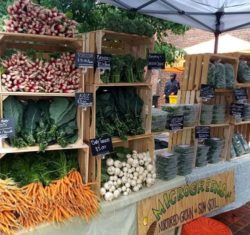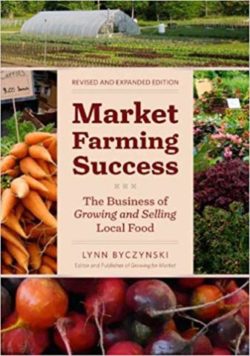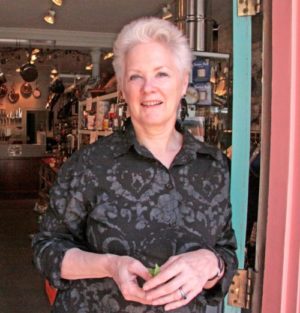Read Time: 4 Minutes Subscribe & Share
Brief History of Alexandria’s Farmers’ Market
Across the street from my apartment is the Old Town Alexandria Farmers’ Market. It has a storied history, beginning with its founding in 1753. When we  first paid an early morning visit (almost 50 years ago) we could buy fresh pork, delicious chickens, hams, butter, and cream to die for, along with local vegetables, fruit, and flowers. It was so local that vegetables in winter were only dense root vegetables, or DRVs as we called them. We watched over the years with growing dismay as some of the old purveyors were shut down thanks to the City government enforcing punitive health regulations. Mind you, we bought their meats, poultry, and dairy for years and suffered not a single ill effect. Then we saw a proliferation of sellers who had oranges, dyed sunflowers in astonishing colors, and other impossible produce that, at best, was picked up at Restaurant Depot. (Citrus groves tend to be scarce even in the most rural parts of Virginia.) A few stalwarts carried on amid the proliferation of craft stands, I am not against crafts, except I have yet to learn how to cook a meal with them. So I folded my little shopping bag and looked elsewhere. FreshFarm Markets was just opening up on Sundays at DuPont Circle and we discovered the Arlington Farmers’ Market, which opened on Saturdays. So we moved on.
first paid an early morning visit (almost 50 years ago) we could buy fresh pork, delicious chickens, hams, butter, and cream to die for, along with local vegetables, fruit, and flowers. It was so local that vegetables in winter were only dense root vegetables, or DRVs as we called them. We watched over the years with growing dismay as some of the old purveyors were shut down thanks to the City government enforcing punitive health regulations. Mind you, we bought their meats, poultry, and dairy for years and suffered not a single ill effect. Then we saw a proliferation of sellers who had oranges, dyed sunflowers in astonishing colors, and other impossible produce that, at best, was picked up at Restaurant Depot. (Citrus groves tend to be scarce even in the most rural parts of Virginia.) A few stalwarts carried on amid the proliferation of craft stands, I am not against crafts, except I have yet to learn how to cook a meal with them. So I folded my little shopping bag and looked elsewhere. FreshFarm Markets was just opening up on Sundays at DuPont Circle and we discovered the Arlington Farmers’ Market, which opened on Saturdays. So we moved on.
San Giovanni’s Farm Is A Hope Fulfilled
 But, in the last few years, Old Town’s historic market has had a renaissance, perhaps fielded by a younger group of
But, in the last few years, Old Town’s historic market has had a renaissance, perhaps fielded by a younger group of  Market Managers. We now have a wonderful composting station, flowers and herbs, cheeses, mushrooms, eggs, meat products, snacks, fruits, vegetables, and milk, which brings me to this latest addition to In My Neighborhood.
Market Managers. We now have a wonderful composting station, flowers and herbs, cheeses, mushrooms, eggs, meat products, snacks, fruits, vegetables, and milk, which brings me to this latest addition to In My Neighborhood.
A tiny stand built from slatted crates opened recently and the owners displayed arugula that was so tender and delicious, I thought I was in Italy. Little breakfast radishes that had a French accent, and an unbelievable selection of microgreens in the summer and winter that we buy weekly to make salads. There is a person in my household, who will easily pick up that second pork chop, but can usually manage to eat only a mouthful of salad. The greens from San Giovanni’s Farm stand have made him a changed man. ( A big plus is that they have small bouquets of flowers seasonally, which will last a week.) and I’ve heard our Kitchen Detail editor wax rhapsodic about some teensy turnips she bought at the stand and sautéed.
The Little Garden That Could
 So here are some vital facts that are important to know about this one-acre farm, which produces not only vegetables, but also herbs, flowers, and outstanding microgreens. San Giovanni’s Farm Garden is certified organic by California Certified Organic Farmers CCOF has strong roots in the history of the organic movement. It was and still is instrumental in advocating for federal organic legislation and their organic certification standards were used as a foundation for the USDA National Organic Program, finally making “certified organic” a federally regulated claim. CCOF has for more than 30 years fought for organic integrity. The organization continues to certify, educate, advocate, and promote organic.. San Giovanni’s, for example, sources their seed from certified organic and non-GMO sources. Their fertilizers are compost, alfalfa, and chicken manure.
So here are some vital facts that are important to know about this one-acre farm, which produces not only vegetables, but also herbs, flowers, and outstanding microgreens. San Giovanni’s Farm Garden is certified organic by California Certified Organic Farmers CCOF has strong roots in the history of the organic movement. It was and still is instrumental in advocating for federal organic legislation and their organic certification standards were used as a foundation for the USDA National Organic Program, finally making “certified organic” a federally regulated claim. CCOF has for more than 30 years fought for organic integrity. The organization continues to certify, educate, advocate, and promote organic.. San Giovanni’s, for example, sources their seed from certified organic and non-GMO sources. Their fertilizers are compost, alfalfa, and chicken manure.
Their growing and harvesting techniques are pretty much done by hand (with some simple machinery). I learned that they use a no-till philosophy, which actually reduces considerably soil erosion from wind and water. No-Till can also diminish demand for fuel and labor and improve the overall health and structure of the soil while repressing weeds, retaining sufficient moisture, and building organic matter in the soil . If you are in the area, you may want to organize a visit to this little garden that could.
Small Market Gardens Are Viable
Although so much of farming in the US has chosen the bright shiny object route, much to our detriment I believe, some interesting statistics should encourage  the type of gardening exemplified by San Giovanni’s Market Garden and others who have chosen this path:
the type of gardening exemplified by San Giovanni’s Market Garden and others who have chosen this path:
One person full-time can hand handle 1 acre of intensive production – and more often it is two people who share the work. This type of farming is suitable to a wide variety of crops, particularly what are called High Dollar Crops: salad mixes, heirloom tomatoes, and cut flowers, for example. These market gardens not only sell in local farmers’ markets, but also to restaurants and through the the CSA movement.
The one-acre ideal goes back to the Middle Ages, when it was the amount of land that could be ploughed in one day with a yoke of oxen (usually a rectangle measuring “four rods by one furlong” or 4, 840 square yards.) And in the 21st century this plot of land can yield $60,000 -$129,00 for mixed vegetables or more, if salad mixes, herbs and cut flowers are grown. As the bulk of expenses is seeds, plants, and supplies (not pesticides, chemical fertilizers, and other Monsanto addictions) and no additional labor, the margin is usually 50% or over.
Check out Lynn Brczinski’s book for a motherlode of information on this little-known agricultural insurgency:

Kitchen Detail shares under the radar recipes, explores the art of cooking, the stories behind food, and the tools that bring it all together, while uncovering the social, political, and environmental truths that shape our culinary world.




Comments are closed here.
Follow this link to create a Kitchen Detail account so that you can leave comments!